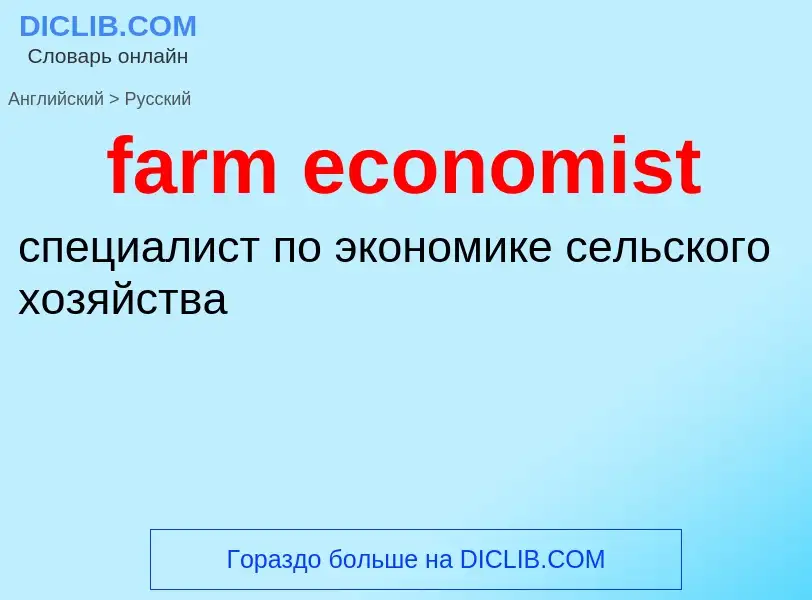Übersetzung und Analyse von Wörtern durch künstliche Intelligenz ChatGPT
Auf dieser Seite erhalten Sie eine detaillierte Analyse eines Wortes oder einer Phrase mithilfe der besten heute verfügbaren Technologie der künstlichen Intelligenz:
- wie das Wort verwendet wird
- Häufigkeit der Nutzung
- es wird häufiger in mündlicher oder schriftlicher Rede verwendet
- Wortübersetzungsoptionen
- Anwendungsbeispiele (mehrere Phrasen mit Übersetzung)
- Etymologie
farm economist - Übersetzung nach russisch
['stʌdfɑ:m]
общая лексика
конный завод
племенная ферма
Definition
Wikipedia
The Economist is a British weekly newspaper printed in demitab format and published digitally. It focuses on current affairs, international business, politics, technology, and culture. Based in London, the newspaper is owned by the Economist Group, with its core editorial offices in the United States, as well as across major cities in continental Europe, Asia, and the Middle East. In 2019, its average global print circulation was over 909,476; this, combined with its digital presence, runs to over 1.6 million. Across its social media platforms, it reaches an audience of 35 million, as of 2016. The newspaper has a prominent focus on data journalism and interpretive analysis over original reporting, to both criticism and acclaim.
Founded in 1843, The Economist was first circulated by Scottish economist James Wilson to muster support for abolishing the British Corn Laws (1815–1846), a system of import tariffs. Over time, the newspaper's coverage expanded further into political economy and eventually began running articles on current events, finance, commerce, and British politics. Throughout the mid-to-late 20th century, it greatly expanded its layout and format, adding opinion columns, special reports, political cartoons, reader letters, cover stories, art critique, book reviews, and technology features. The paper is often recognizable by its fire engine red nameplate and illustrated, topical covers. Individual articles are written anonymously, with no byline, in order for the paper to speak as one collective voice. It is supplemented by its sister lifestyle magazine, 1843, and a variety of podcasts, films, and books.
The editorial stance of The Economist primarily revolves around classical, social, and most notably economic liberalism. It has supported radical centrism as the concept became established in the late 20th century, favouring policies and governments that maintain centrist politics. The newspaper typically champions economic liberalism, particularly free markets, free trade, free immigration, deregulation, and globalisation. Despite a pronounced editorial stance, it is seen as having little reporting bias, and as exercising rigorous fact-checking and strict copyediting. Its extensive use of word play, high subscription prices, and depth of coverage has linked the paper with a high-income and educated readership, drawing both positive and negative connotations. In line with this, it claims to have an influential readership of prominent business leaders and policy-makers.

![Liaoning Provincial Library]]. Page 28 from the 1 June 2019 issue, about the [[1989 Tiananmen Square Protests]], has been removed. Liaoning Provincial Library]]. Page 28 from the 1 June 2019 issue, about the [[1989 Tiananmen Square Protests]], has been removed.](https://commons.wikimedia.org/wiki/Special:FilePath/A page ripped out from The Economist by China's censorship department (cropped).jpg?width=200)

![Scottish economist [[Adam Smith]] (right) and philosopher [[David Hume]] (left) represent the newspaper's foundational beliefs of ''[[laissez-faire]]'' policies, self-sufficiency, anti-protectionism and [[free trade]]. Scottish economist [[Adam Smith]] (right) and philosopher [[David Hume]] (left) represent the newspaper's foundational beliefs of ''[[laissez-faire]]'' policies, self-sufficiency, anti-protectionism and [[free trade]].](https://commons.wikimedia.org/wiki/Special:FilePath/David Hume and Adam Smith statues, Edinburgh.jpg?width=200)


![technical manuals]], 2020 technical manuals]], 2020](https://commons.wikimedia.org/wiki/Special:FilePath/The Economist Books.jpg?width=200)
![[[Zanny Minton Beddoes]] was appointed editor in 2015, first joining as an [[emerging markets]] correspondent in 1994. [[Zanny Minton Beddoes]] was appointed editor in 2015, first joining as an [[emerging markets]] correspondent in 1994.](https://commons.wikimedia.org/wiki/Special:FilePath/Zanny Minton Beddoes World Economic Forum 2013 cropped.jpg?width=200)
![Žabnik]] at [[Sveti Martin na Muri]], [[Croatia]], is owned by the ''Međimurje nature'' public institution Žabnik]] at [[Sveti Martin na Muri]], [[Croatia]], is owned by the ''Međimurje nature'' public institution](https://commons.wikimedia.org/wiki/Special:FilePath/Ergela međimurskog konja, Žabnik (Croatia) - kobile.jpg?width=200)
![A large stud farm in [[Gdynia]], [[Poland]] A large stud farm in [[Gdynia]], [[Poland]]](https://commons.wikimedia.org/wiki/Special:FilePath/Pl-gdynia-kolibki-stadnina.jpg?width=200)
